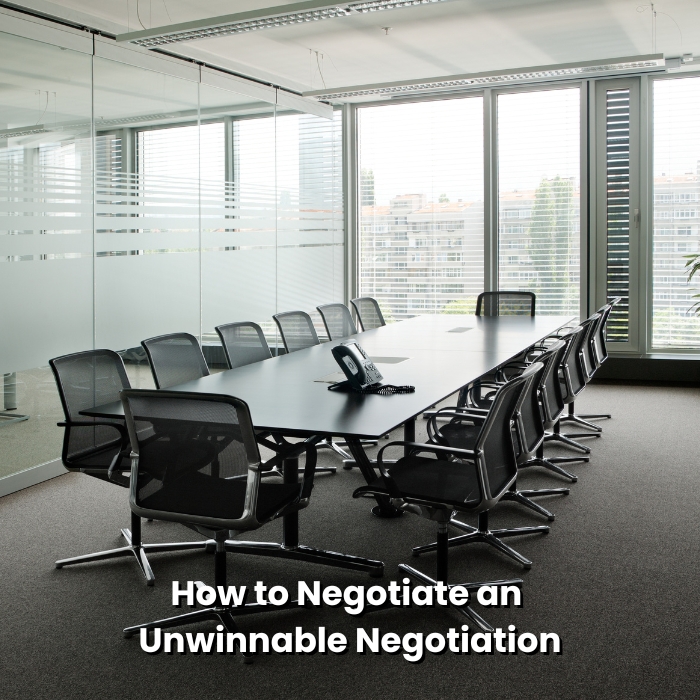
Speak More Slowly to Get Better Negotiation Outcomes
Speak More Slowly to Get Better Negotiation Outcomes
I’m a fast talker. Always have been. I’d always seen it as a benefit as I could get more information out in a shorter time. Turns out I was wrong. Fast talking gets you less. If you want to strengthen your bargaining position, the key is to slow down. Speaking more slowly gets better negotiation outcomes.
Why is that?
It makes sense when you think about it. Negotiation is a delicate dance. You don’t want (or enjoy) a partner who whips you around the dance floor so you can’t get your footing. Listen to the music. It’s a dynamic process. Allow yourself adagio rather than allegro.
Rapport
Building rapport is key to effective negotiations. This requires relationship building. Speaking quickly is less likely to build rapport. It increases the cortisol response in the other party, increasing stress reactions. The other party is not aware of this consciously – they just feel a resistance and negative charge.
Trust
Trust-building is also critical to getting best negotiated outcomes. Whether justified or not, fast talkers are viewed as less trustworthy. They remind people of used car salesmen (a group who notoriously get a bad rap). The immediate assumption is that you’re trying to baffle with B.S. or dazzle with empty rhetoric. Tied to that is the assumption (whether conscious or unconscious) that you’re trying to hide something – to bury the rotten egg in all the words.
Instead, allow yourself the gift of fully formulating your thoughts so you can best frame your position. Equally, if not more importantly, allow the other party the opportunity to fully process and understand what you’re saying.
Lower Guard
By contrast, slower speech puts people at ease. They don’t feel rushed and accordingly are less likely to have those defensive walls built to maximum height. It allows the time to contemplate, which allows for a certain relaxation and lowers the guard reflex.
Some people talk fast hoping to deprive the other party of the chance to think too deeply, believing that more time decreases the likelihood of the other party giving what they want. The opposite is usually true. Tied to that, effective negotiators seek genuine buy-in to allow for longer-lasting agreements and better relationships. Trying to jam a deal does not achieve these goals.
Comfort
Tied to trust, is comfort. Negotiation is stress-inducing at the best of times for many people. This causes some people to speed talk, wanting to get the uncomfortable process over as soon as possible. This is a mistake. Fast talking adds to this stress – both for the speaker and the receiver.
The mood of a negotiation can be a key factor in determining outcomes. Setting an ambience where both parties are comfortable can get better results and build for long-term relationships with longer term benefits.
Getting a Good Read
In any negotiation it’s important to get a solid ‘read’ on the other party, the situation, both the stated and unstated needs, the likely obstacles, etc. If you rush, you miss out on valuable information, innuendo, subtlety, motivations, the deeper why, other opportunities and more.
Curiosity is key. Engaging in speed-dating negotiating styles doesn’t allow you to dig. Asking questions helps uncover hidden motivations, desires, or blocks. This information is pure gold in a negotiation allowing for more creative solutions. Rushing the process doesn’t allow these hidden gems to surface.
Allows Space
Sometimes the gold is in the empty spaces. Silence can be a tremendously effective tool in negotiations. Allow the space for silence. Be sure to pause. Be sure to truly listen. Contrary to popular belief, the person talking the loudest and longest is not ‘winning’ the negotiation. To the contrary, they have lost control of the negotiation.
Added to that, slowing the pace allows you to control the process. Pacing can be a powerful ally in negotiations. Slow and steady builds momentum while simultaneously building trust and relationship.
Space also allows room for creative juices to flow and for out of the box options to crystallize and form.
So the next time you’re about to negotiate, whether in your personal or professional life (and make no mistake, all of life is a negotiation) take a breath, slow down, and speak more slowly to strengthen your bargaining position.
- When and How to Apologize In A Negotiation - November 27, 2024
- When to Get the Deal in Writing - November 26, 2024
- Elevated Active Listening: The Secret Sauce to Effective Negotiating - November 25, 2024






